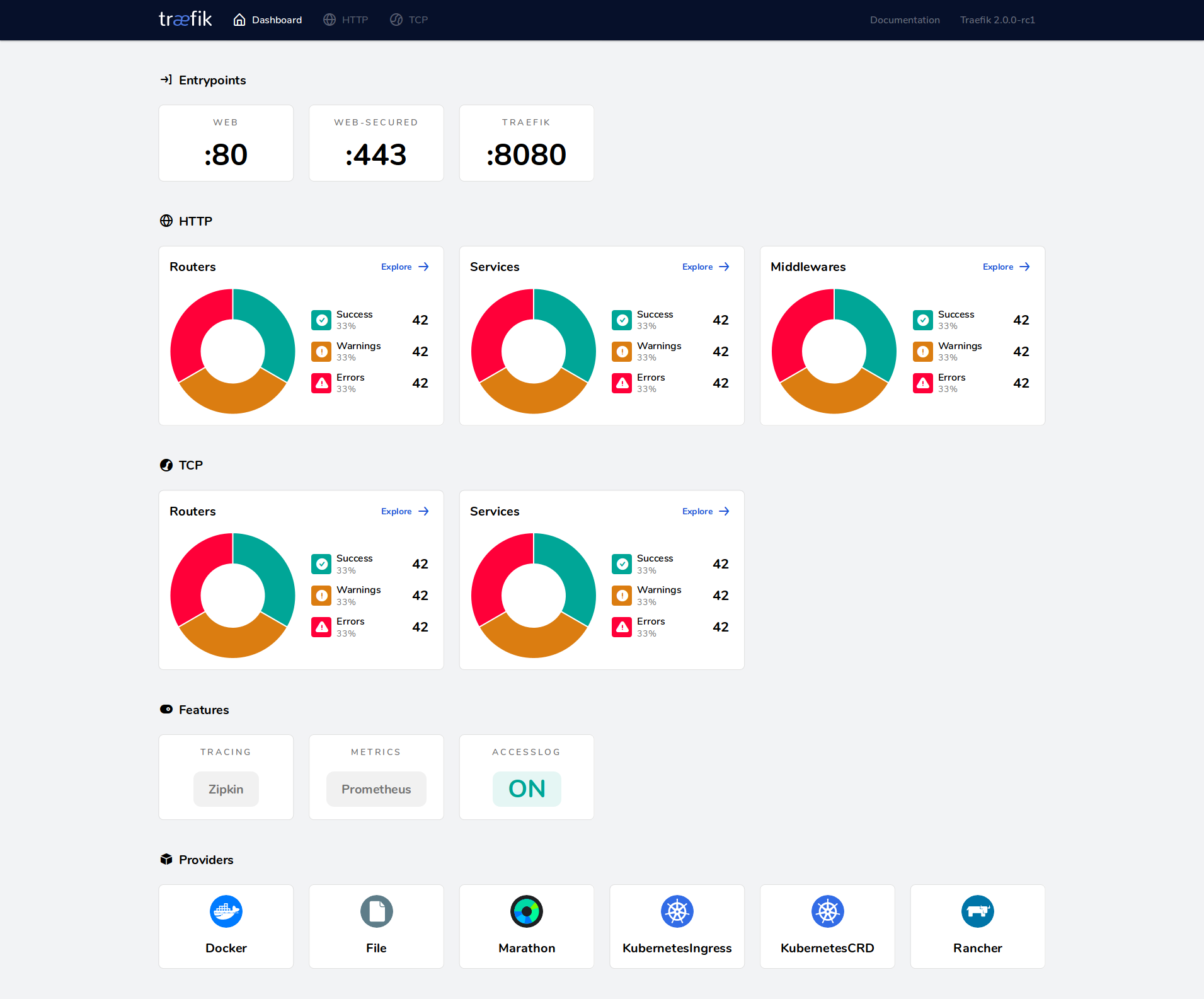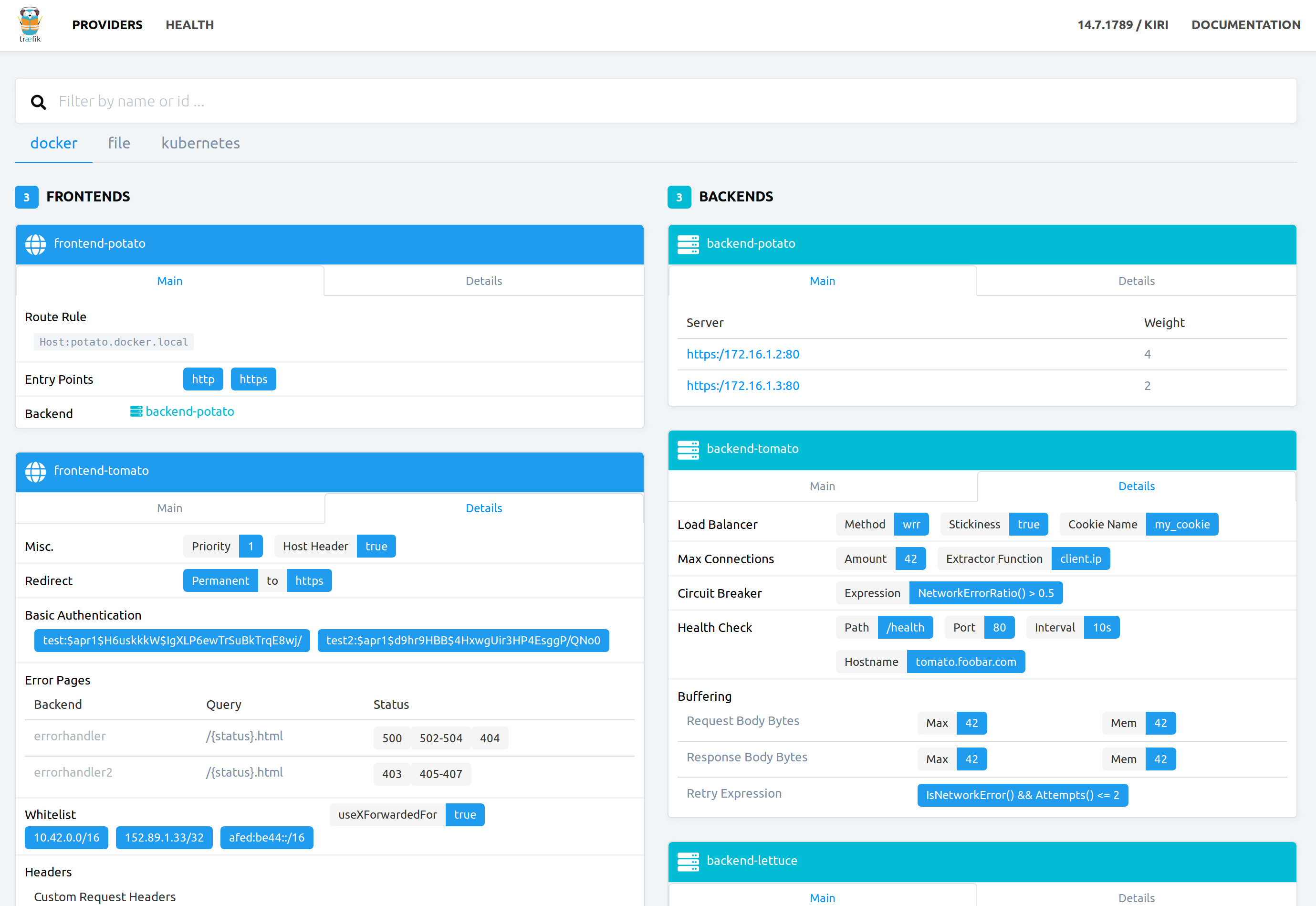Traefik is a modern HTTP reverse proxy and load balancer that makes deploying microservices easy.
Traefik integrates with your existing infrastructure components (Docker, Swarm mode, Kubernetes, Marathon, Consul, Etcd, Rancher, Amazon ECS, ...) and configures itself automatically and dynamically.
Pointing Traefik at your orchestrator should be the only configuration step you need.
Enable docker provider and web UI:
## traefik.yml
# Docker configuration backend
providers:
docker:
defaultRule: "Host(`{{ trimPrefix `/` .Name }}.docker.localhost`)"
# API and dashboard configuration
api:
insecure: trueStart Traefik:
docker run -d -p 8080:8080 -p 80:80 \
-v $PWD/traefik.yml:/etc/traefik/traefik.yml \
-v /var/run/docker.sock:/var/run/docker.sock \
traefik:v2.5Start a backend server, named test:
docker run -d --name test traefik/whoamiAnd finally, you can access to your whoami server throught Traefik, on the domain name test.docker.localhost:
# $ curl --header 'Host:test.docker.localhost' 'http://localhost:80/'
$ curl test.docker.localhost
Hostname: 390a880bdfab
IP: 127.0.0.1
IP: 172.17.0.3
GET / HTTP/1.1
Host: test.docker.localhost
User-Agent: curl/7.65.3
Accept: */*
Accept-Encoding: gzip
X-Forwarded-For: 172.17.0.1
X-Forwarded-Host: test.docker.localhost
X-Forwarded-Port: 80
X-Forwarded-Proto: http
X-Forwarded-Server: 7e073cb54211
X-Real-Ip: 172.17.0.1The web UI http://localhost:8080 will give you an overview of the routers, services, and middlewares.
Grab a sample configuration file and rename it to traefik.toml. Enable docker provider and web UI:
## traefik.toml
# API and dashboard configuration
[api]
# Docker configuration backend
[docker]
domain = "docker.localhost"Start Traefik:
docker run -d -p 8080:8080 -p 80:80 \
-v $PWD/traefik.toml:/etc/traefik/traefik.toml \
-v /var/run/docker.sock:/var/run/docker.sock \
traefik:v1.7Start a backend server, named test:
docker run -d --name test traefik/whoamiAnd finally, you can access to your whoami server throught Traefik, on the domain name {containerName}.{configuredDomain} (test.docker.localhost):
# $ curl --header 'Host:test.docker.localhost' 'http://localhost:80/'
$ curl 'http://test.docker.localhost'
Hostname: 117c5530934d
IP: 127.0.0.1
IP: ::1
IP: 172.17.0.3
IP: fe80::42:acff:fe11:3
GET / HTTP/1.1
Host: test.docker.localhost
User-Agent: curl/7.35.0
Accept: */*
Accept-Encoding: gzip
X-Forwarded-For: 172.17.0.1
X-Forwarded-Host: 172.17.0.3:80
X-Forwarded-Proto: http
X-Forwarded-Server: f2e05c433120The web UI http://localhost:8080 will give you an overview of the frontends/backends and also a health dashboard.
You can find the complete documentation:
A community support is available at https://community.traefik.io
A collection of contributions around Traefik can be found at https://awesome.traefik.io.


